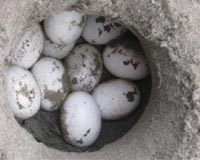| . |  |
. |
Banzena, Mali (AFP) July 5, 2010 Ali Ag Rhissa, a young Touareg nomad, sits in his tent, his gun ready, on the frontline of one of Mali's battles -- protecting its majestic but dwindling herds of desert elephants. Faced with the dual threat of drought and poachers, the elephant population has almost halved in recent decades. But help is at hand from local people in northern Mali, who have started to form conservation brigades to ward off poachers and protect the animal from extinction. Between 1972 and 1974 there were 550 elephants in the Gourma region, now there are no more than 354. In June alone, severe drought killed 21 of the animals. The elephants of the Gourma are the biggest in Africa and are tempting quarry for poachers, both for their ivory tusks and their meat, which is popular in neighbouring countries. "When we hear the sound of a vehicle, we get ready to make sure the poachers can't settle here and kill our elephants," said Rhissa, who lives in a tent with his wife and three children in Banzena, near Timbuktu. "We take precautionary measures. In this no elephants have been victims of poaching since we organised our protection brigades," said Bakary Kame, a water and forestry ranger. "But you can never be too careful," added Kame, who had a rifle slung across his back. According to official statistics, 50 percent of the elephants in the Gourma are adult females, with 11 per cent male adults, 26 percent young and 11 percent "very old". Gourma elephants are the only nomadic elephants in the world and the only ones that live in the desert apart from a group in Namibia. Every year, they migrate hundreds of kilometres (miles) along the southern edge of the Sahara towards the border with Burkina Faso and back again in search of food and water. Each one consumes up to 250 kilograms (500 pounds) of vegetation per day, and can suck up 10 litres in every trunkful of water. They leave huge footprints close to a metre (three feet) deep when they trek across the barren landscape. "To protect them from poachers, we have placed GPS chips in collars around the necks of some of the elephants. This way, we know where they are all the time," said Biramou Sissoko, the national coordinator for the government programme to conserve the elephants and biodiversity in the Gourma. The government of Mali is taking steps to protect the elephants. Efforts are being made to educate local people about the plight of the animals, while legislation is also being drawn up to combat poaching. The conservation action plan has been launched to protect the elephants' ecosystem, and "biodiversity co-ordinators" are being appointed under Sissoko. "Our role is to educate, and raise awareness of the damage done by poachers and the destruction of the environment," said Amadou Bore, one of the co-ordinators. "Whoever comes here to take the tusks of elephants will find instead our own tusks -- our rifles," he said.
Share This Article With Planet Earth
Related Links Darwin Today At TerraDaily.com
 Turtle eggs to be rescued from Gulf of Mexico spill
Turtle eggs to be rescued from Gulf of Mexico spillMiami (AFP) July 2, 2010 In an ambitious and unprecedented plan to save wildlife, volunteers in coming weeks will move tens of thousands of turtle eggs from oil-soaked Gulf of Mexico beaches to safety on Florida's Atlantic coast. The eggs, which could number some 70,000, will be carefully hand-picked, placed in special containers, and in driven in temperature-controlled FedEx trucks starting in mid-July, according t ... read more |
|
| The content herein, unless otherwise known to be public domain, are Copyright 1995-2010 - SpaceDaily. AFP and UPI Wire Stories are copyright Agence France-Presse and United Press International. ESA Portal Reports are copyright European Space Agency. All NASA sourced material is public domain. Additional copyrights may apply in whole or part to other bona fide parties. Advertising does not imply endorsement,agreement or approval of any opinions, statements or information provided by SpaceDaily on any Web page published or hosted by SpaceDaily. Privacy Statement |